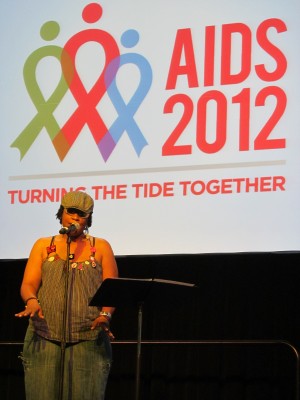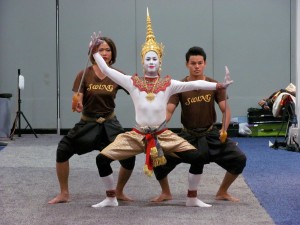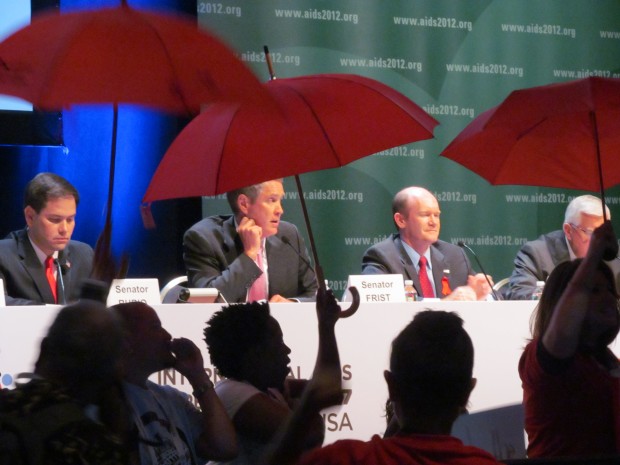“I don’t know how we’re going to ever see an end to AIDS in our lifetime – and we believe we can, especially with scientific advances – and have an AIDS-free generation, without including all of those populations who must be involved as part of this solution,” she told the crowd at the opening ceremony.
Regardless of the protests, more than 23,000 people from 183 countries attended the weeklong conference. And that's just the people who were registered. Then there are all the people who attended one of the conference’s highlight activities -- the Global Village, open to the general public at no cost.
 People and organizations from around the world held nearly 300 activities and events. Oakland native Roxanne Hanna-Ware gave a spoken word performance called “Crimson Words” about her life as an HIV-positive woman and the stigma that exists along with it.
People and organizations from around the world held nearly 300 activities and events. Oakland native Roxanne Hanna-Ware gave a spoken word performance called “Crimson Words” about her life as an HIV-positive woman and the stigma that exists along with it.
Also in the Global Village were exhibits of artwork about HIV/AIDS issues and cultural performances by SWING (Service Workers In Group), an HIV prevention and care program for male and transgendered sex workers in Thailand. Many sessions in the conference were broadcast into the Global Village for public viewing.
For registered conference attendees, the daily plenary sessions were generally the highlight activities that drew in the most people. They featured high-profile speakers including Phill Wilson, the Executive Director of the Black AIDS Institute, and Secretary of State Hillary Clinton. However, these sessions were also the target of many protesters.
“What would an AIDS conference be without a little protesting,” joked Secretary Clinton, as she stood on stage in front of activists protesting President Obama’s trade policies.
But even with all of the presentations on the latest HIV/AIDS research, there is still no cure for the disease that has killed nearly 30 million people globally. Instead, many speakers declared that there are still many battles to fight and that we’ve only reached the beginning of the end of the HIV/AIDS epidemic.
Speakers including musician Elton John pointed to stigma and homophobia as challenges to future HIV/AIDS prevention efforts.
“We have to replace the shame with love. We have to replace the stigma with compassion. No one should be left behind,” I watched him say to a room full of people.
During the closing ceremony last Friday, California Congresswoman Nancy Pelosi praised the efforts in fighting AIDS but warned that the battle against the disease is far from over.
“This optimism must not make us complacent. It cannot. It must instead heighten our resolve. We have an obligation to be innovative and courageous in our thinking,” said Congresswoman Pelosi, “Where there is scientific opportunity, we have a moral obligation to fund it. Where there are people in need of drugs and care, communities in need of protection, we have a moral obligation to provide it. And where there is discrimination, we have a moral obligation to continue to fight it.”
The next International AIDS Conference will be held in the summer of 2014 in Melbourne, Australia.


